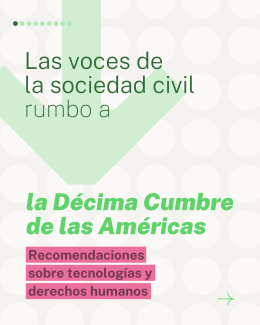Joint contribution regarding the 10th Summit of the Americas
The governments of the region will meet next December in the Dominican Republic for the 10th Summit of the Americas. Several critical issues related to citizen security, shared prosperity, and sustainability have already been defined for the agenda. As this is a decision-making forum that affects the entire region, together with 25 other civil society and academic organizations, we ask that the agenda and decisions taken take into account human rights in the digital age.
Among the signatories is AlSur, a consortium of 11 Latin American organizations dedicated to defending human rights in digital environments. Together, these voices have developed a Joint Contribution that is both a diagnosis and a roadmap for ensuring that technology serves people, and not the other way around.
The document starts from an observation: digital civic space is now as important as public squares, streets, or the media. Without meaningful access to the internet, without digital skills, and without transparency in the use of technologies by states, citizen participation and democracy itself are weakened. That is why they propose policies that recognize internet access as an essential right, that promote interoperability and open software, and that promote digital literacy programs with a gender perspective to close gaps and prevent online violence.
Another warning concerns state surveillance. In the last decade, technologies for mass monitoring, biometric recognition, interception of communications, and use of spyware have multiplied in the region, often without controls, transparency, or sufficient legal justification. The organizations are calling for a halt—even with moratoriums—to the use of tools that put human rights at risk, for prior judicial authorization to be required, and for any security policy to be designed with citizen participation and accountability.
The digitization of the state, which promises efficiency and transparency, also carries risks if it is done without diagnosis, democratic control, or data protection. The Joint Contribution warns that in several countries, automated and artificial intelligence systems are already making decisions that directly affect access to social policies, without people knowing how they work or having the possibility of appeal. That is why they are calling for human rights impact assessments before implementing these technologies, as well as contracts that require transparency, audits, and the use of open solutions that can be reviewed by citizens.
The handling of personal data and cybersecurity are the fourth major front. In many countries, data protection laws are weak or non-existent, and leaks and misuse are becoming increasingly frequent. The organizations are calling for legal loopholes to be closed, supervisory authorities to be strengthened, and measures to prevent information collected for a public service from being used to train artificial intelligence systems without people's consent.
Finally, the proposal includes a chapter on regional cooperation: shared standards for data protection and technological governance, transparency in the purchase and use of surveillance technologies, and multisectoral dialogue platforms that integrate diversity, equity, and inclusion into technological development.
In short, the message is clear: the digital future of the Americas must be built with human rights at its core. And the 10th Summit of the Americas is an opportunity that should not be wasted.



